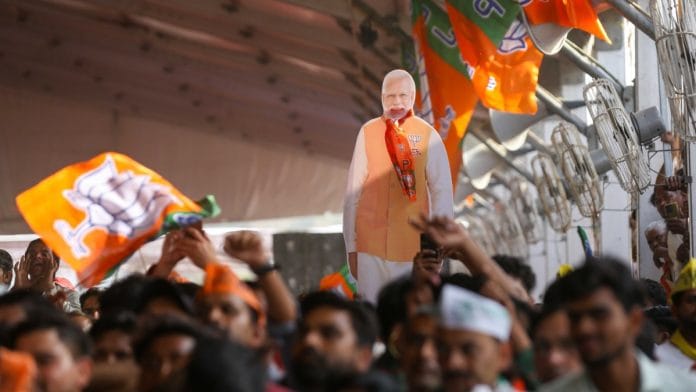Thank you dear subscribers, we are overwhelmed with your response.
Your Turn is a unique section from ThePrint featuring points of view from its subscribers. If you are a subscriber, have a point of view, please send it to us. If not, do subscribe here: https://theprint.in/subscribe/
When Narendra Modi swept to power in 2014, his campaign centred on promises of transformative economic reforms, minimal government intervention, and a corruption-free India. As his government approaches its twelfth year in power, there’s a striking disconnect between its unprecedented political dominance and its reform agenda, raising questions about the trajectory of India’s economic future.
The Infrastructure Success Story
Modi’s government has demonstrated remarkable success in certain areas, particularly infrastructure development. The pace of highway construction has accelerated significantly, transforming India’s road network. The digital revolution, exemplified by the UPI payment system and widespread mobile adoption, has positioned India as a leader in digital infrastructure. These achievements have modernised daily life for millions of Indians and improved ease of doing business in specific sectors.
The Banking Sector Clean-up
Another notable achievement has been the resolution of non-performing assets (NPAs) in the banking sector, addressing a critical problem that had plagued India’s financial system. This clean-up, though painful, has strengthened the banking sector’s foundation.
Foreign Policy and Security
On the security front, India has shown increased assertiveness, particularly in standing up to Chinese territorial aggression. This marks a departure from previous administrations’ more cautious approach to border disputes.
The Reform Deficit
However, the core economic reforms that many expected from Modi’s government have largely remained unrealized. The promise of “Minimum Government, Maximum Governance” appears to have given way to increased regulation and state intervention. The privatization of public sector undertakings (PSUs) and state-owned banks, considered crucial for improving efficiency and reducing government involvement in business, has seen minimal progress.
The concentration of economic power in a few corporate houses, particularly the Adani and Ambani groups, has raised concerns about crony capitalism. The control of major ports by the Adani group and the apparent protection of certain business interests through regulatory policies suggests a departure from the principle of creating a level playing field for all businesses.
Foreign investment policies have remained restrictive in sectors like retail, with companies like Walmart facing significant obstacles. This protectionist approach appears designed to shield domestic players rather than promote healthy competition and efficiency.
The Institutional Challenge
Perhaps most concerning is the perceived weaponization of state institutions like the Enforcement Directorate, Income Tax Department, and investigative agencies against political opponents. While corruption at the ministerial level may have decreased, the systemic corruption in government offices and state administrations persists. The selective application of anti-corruption measures, where joining the ruling party appears to provide immunity from prosecution, undermines the credibility of anti-corruption efforts.
Critical Reforms Left Untouched
The government has shown little appetite for fundamental reforms in crucial sectors like education, healthcare, and law enforcement. These structural reforms are essential for building human capital and improving governance but remain largely unaddressed. The absence of a comprehensive reform agenda in these areas could limit India’s long-term growth potential.
The Religious and Cultural Focus
Instead of pursuing economic reforms, the government has focused on cultural and religious issues that appeal to its core Hindu base. While initiatives like the Ram Mandir construction, Kashmir’s changed status, and the Uniform Civil Code have consolidated political support, they don’t address India’s fundamental economic challenges.
The Return to Populism
Contrary to expectations of reduced government intervention, there has been an increase in populist measures and welfare schemes. While social welfare is important, the growing culture of freebies across political parties threatens fiscal discipline and economic stability.
The Legacy Question
The contrast with previous reform periods is striking. The 1991 reforms under P.V. Narasimha Rao and Manmohan Singh, continued by Atal Bihari Vajpayee, transformed India’s economy through liberalization and reduced government control. The current administration, despite its strong political mandate, appears hesitant to pursue similar bold reforms.
Looking Ahead
The paradox of Modi’s governance lies in its strong political position coupled with reform hesitancy. While some sectors have seen impressive progress, the broader economic reform agenda remains unfulfilled. The government’s focus on political consolidation and cultural issues, while successful in electoral terms, may come at the cost of economic modernization and structural reforms.
The key question is whether political dominance without corresponding economic reforms can sustain India’s growth aspirations. As global economic patterns shift and new challenges emerge, India needs more than infrastructural improvements and digital advances. It requires comprehensive reforms in education, healthcare, governance, and market structures to realize its economic potential.
Modi’s government still has the political capital to implement significant reforms. However, unless this political strength is channeled toward meaningful economic transformation, India might miss a historic opportunity to achieve sustained high growth and comprehensive development. The true measure of political success should be not just electoral victories but the creation of lasting institutional and economic frameworks that enhance India’s global competitiveness and improve citizens’ living standards.
The author Amarendra Reddy Sagila is a Data Governance Specialist based in Virginia, USA. He holds an MBA in Finance from SUNY Buffalo. As the founder of FutureCompaz, he is dedicated to equipping youth with the skills they need to succeed in all facets of life.
These pieces are being published as they have been received – they have not been edited/fact-checked by ThePrint.


